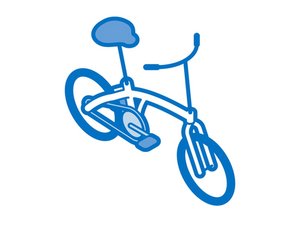Introduction
Got a squeaking or squealing noise from your brakes—either whenever you apply them, or even when you're not? Check the probable causes (and solutions) outlined below to get your bike’s stopping power back to silent operation.
First Steps
- Determine what kind of brakes your bike has. This page applies to rim brakes (examples of which include v-brakes, caliper brakes, u-brakes, cantilever brakes, etc.). If your bike has disc brakes, see this page instead.
- Visually inspect your brakes. With your bike stationary, bend down and check the condition of your brakes while operating them a few times. Try spinning the wheel freely in the air and then test the brakes to see what happens. Make sure your brakes are clean, have sufficient braking material left, and clamp firmly and evenly. This can provide a clue to one or more of the underlying problems outlined below.
Causes
Brakes can squeak when it’s raining or when debris or mud interferes with their normal operation. Some squeaking when the brakes are wet is normal. If your brakes quiet down after drying off, it’s likely no fix is necessary.
Contamination can also occur with dirt and other debris getting lodged in the brake block’s grooves. Oil or bike lubricant can stick to the rim or brake blocks and cause squeaking.
If you need to clean your brakes, see this guide.

- 5 - 10 minutesVery easy
Your brake pads may squeak, squeal, or chatter if they aren’t set up correctly.
Adjust alignment with the rim. Squeeze the brake levers and check that the brake pads make contact only on the smooth flat surface of the rim. If the pads are not correctly aligned, they may make contact with the tire (which is dangerous and may make noise) or they may only partially make contact with the rim. Check this guide for how to adjust your brake pads:
Shimano Ultegra 6800 Caliper Brake Maintenance
Adjust toe in. Slowly apply the brakes and check to make sure the leading edge of your brake pad makes contact with the rim before the trailing edge. This is called “toeing in” your brake pads, and cuts down on unwanted vibrations that can manifest as a stuttering, jittering, squeaking or squealing sound. Check out this video for how to properly toe in your brake pads:

- 15 minutesEasy
If you haven’t changed your brake pads in a while, check the condition of the pads and make sure there’s still sufficient pad left. In extreme cases, the pads may have worn down completely, resulting in metal-on-metal contact with the rim. In addition to being noisy, overly worn pads can damage the rim, and potentially result in serious injury as braking performance will be seriously compromised.

- 20 minutesModerate







